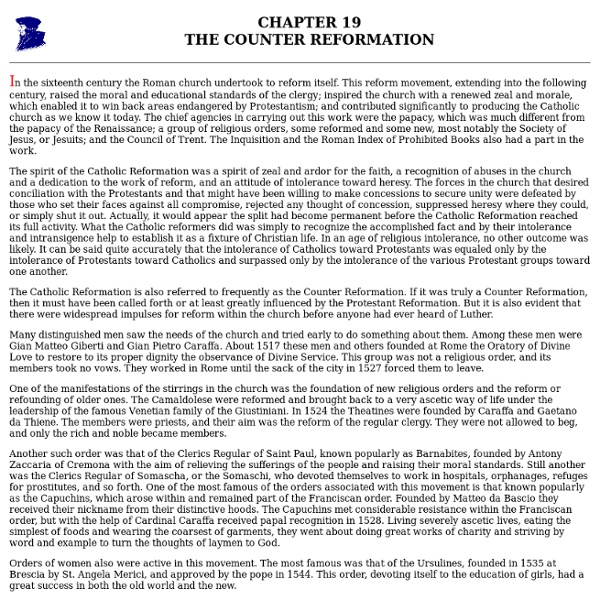THE COUNTER REFORMATION

counter reformation
A copy of the Vulgate (the Latin edition of the Catholic Bible) printed in 1590, after many of the Council's reforms had begun to take place in Catholic worship. The Counter-Reformation (also the Catholic Revival[1] or Catholic Reformation) was the period of Catholic revival beginning with the Council of Trent (1545–1563) and ending at the close of the Thirty Years' War (1648), and was initiated in response to the Protestant Reformation. The Counter-Reformation was a comprehensive effort composed of four major elements: Ecclesiastical or structural reconfigurationReligious ordersSpiritual movementsPolitical dimensions Council of Trent[edit] A session of the Council of Trent, from an engraving. Pope Paul III (1534–1549) initiated the Council of Trent (1545–1563), a commission of cardinals tasked with institutional reform, addressing contentious issues such as corrupt bishops and priests, indulgences, and other financial abuses. Religious orders[edit] Politics: The Netherlands[edit]
The Counter-Reformation
The subject will be considered under the following heads: I. Significance of the term II. Low ebb of Catholic fortunes III. St. Ignatius and the Jesuits, pioneers of the new movement IV. Significance of the term The term Counter-Reformation denotes the period of Catholic revival from the pontificate of Pope Pius IV in 1560 to the close of the Thirty Years' War, 1648. Another point to be noticed is that, though we assign certain dates for the beginning and end of the period under consideration, there has never been any break in the striving of the Church against the heresies which arose in the sixteenth century. The span of time during which this enthusiasm lasted may be justly considered as an historical period, and it is that which we call the period of the Counter-Reformation. Low ebb of Catholic fortunes "From the time of St. Germany Poland "Poland is in almost as hopeless a state." France and Spain "The disorders in France and Spain are too well known for me to speak of them."
Individuals and the Counter-Reformation
The role of individuals cannot be underestimated when studying the outcome of the Counter-Reformation. The likes of Ignatius Loyola founding the Jesuits is well documented as are the 'big' issues such as the Council of Trent, the Index, the Inquisition etc. However, the role of the individual can easily be overlooked. Charles Borromeo (1538 – 1584) was born into wealth. He was a monk at 8 and a titular abbot at 13 i.e. symbolising everything that was wrong with the Catholic Church. In 1559 he was appointed a cardinal (aged 21) and in the same year archbishop of Milan. At this time he underwent a spiritual change and decided to devote his life to the Catholic Church. Francis Xavier (1506 - 1552) was one of the original Jesuits and one of the greatest missionaries of all time. Philip Neri (1515 - 1595) founded the Congregation of the Oratory. In 1551, he became a priest and grouped around him a congregation of priests at the church of San Girolamo.
Important religious orders and the Counter-Reformation
A number of important religious orders were started during the Counter-Reformation. A number of these religious orders were established which concentrated on helping the sick and needy in their own locality. The people in these religious orders did not question Catholic ideology though they were concerned about the direction the Church was going in. Their work satisfied the Catholic belief in "salvation through good works’ and improved Catholic standing in cities such as Rome, Milan and Augsburg. The Rome Oratory later formed the Theatines and one of the Theatines founders was Caraffa. The Ursulines were founded in Brescia in 1535. The Somaschi were founded in 1530 in Venetia and they concentrated on helping orphans. The Barnabites were founded in c1530 in Milan and they concentrated on pastoral care. All the above were attempts to rediscover the original spirit of friars and they also sought to spread the true Catholic faith. They expanded rapidly after 1570.
Related:
Related:



